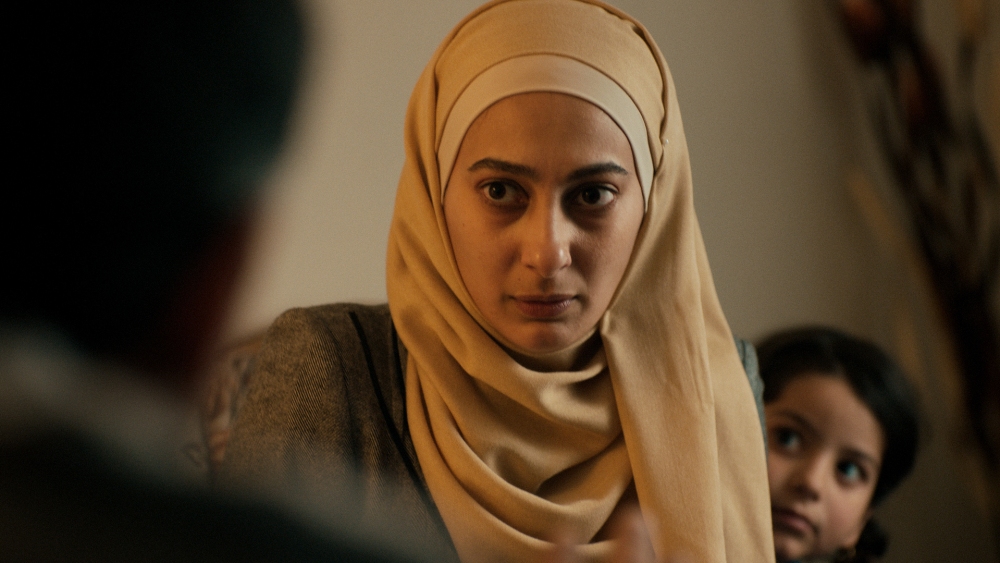
In “Inshallah a Boy,” selected for Cannes’ Critics Week, women talk about sex and pregnancy. They also address misogyny and social injustice. But most of all, they say no.
“The main idea was to talk about a woman who refuses something that’s considered normal in her society,” points out director Amjad Al Rasheed, celebrating his feature debut.
In the Jordan-set film, Nawal (Mouna Hawa), after her husband’s sudden death, finds out that according to local inheritance law, and because she “only” gave birth to a daughter, his family might be entitled to everything she owns, including her home. Out of options, she pretends to be pregnant again.
Despite its Cannes premiere — and his previous win at Venice’s Final Cut — Al Rasheed remains cautious when discussing the film’s future reception at home.
“I can’t predict people’s reactions, but I am going to be honest: there are already plenty of negative comments out there. I don’t know why, but there is this feeling that we, Jordanians, don’t make good films — even when they go to Cannes. Or that they are too scandalous,” he says. Noting that at the end of the day, he just wants to open a conversation.
“It all comes down to the same thing: this male-dominated society that controls everything, women, minorities and everyone who is a bit different. If, according to that old saying, women make up one half of the society, how are we supposed to function or evolve if that half is suffering from inequality and oppression?” he wonders.
“Let’s see what the Jordanians are going to say.”
While the law he describes still exists, the sense of hopelessness, of being taken advantage of, crosses borders, he states.
“This law is absurd and it doesn’t make sense, but there are other laws that make women suffer — just think about the fight for equal pay. When we were developing the film, we would go to different places, meet different producers and hear: ‘I know this situation. I know what you are talking about.’ So yes, I do think it’s relatable.”
“Inshallah a Boy” was produced by Rula Nasser and Aseel Abu Ayyash for Imaginarium Film, co-produced by Nicolas Lepretre and Raphaël Alexandre for Georges Film and Yousef Abed Alnabi for Bayt Al Shawareb. Pyramide Intl. is handling sales.
Nawal’s story was inspired by Al Rasheed’s own relative, who found herself in a very similar predicament after having dedicated her whole life to her family.
“She bought a house, but her husband insisted on putting the deed in his name, arguing it’s shameful for a man to be living in a woman’s house. She did it, even though she had three daughters. When he passed away, his family came over and said: ‘We allow you to stay in this house.’ I thought to myself: ‘Oh wow. And what if they wouldn’t?’”
Still, in his film, Nawal is not the only one struggling. In a wealthy Christian household of her employer, another woman is considering divorce.
“I am Muslim, but I was raised in a French Catholic school. Whichever religion you are following and whatever your social status, as a woman, you are always viewed as the weakest link. In my society, women feel that the law, or even their own family, is conspiring against them.”
Adding some thriller-ish elements to the mix — “I needed her to be always dealing with a new problem. It’s a snowball effect,” he says — Al Rasheed also sought advice from female collaborators and friends, including producer and co-writer Rula Nasser.
“Her input, as well as that of our French co-writer [Delphine Agut], was crucial. If it wasn’t for them, I wouldn’t be able to fully access that feminine voice, although my family was full of women. I would listen to their stories about men, about suffering and abuse: verbal, physical,” he recalls.
“In the past, I used to make corporate videos about successful Jordanian women. Some details that never made the cut stayed with me, like the fact that women are not allowed to put their underwear on display,” he says, referencing the film’s opening scene when Nawal’s bra falls from her balcony only to be picked by a stranger.
“In a way, it anticipates the rest of the story. She loses what’s rightfully hers because of a man,” he states.
But while he still wanted to make all his characters feel human, Al Rasheed approaches the future with caution.
“From how I see things, I am not that optimistic. We would need some big changes to happen. Right now, I feel the responsibility to reflect our reality. And make people think about where we are.”











